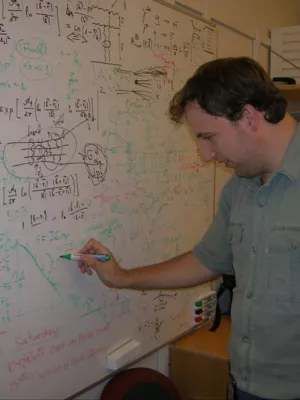
Roman Pasechnik
Senior lecturer

Quasi-Classical Gravity Effect on Neutrino Oscillations in a Gravitational Field of a Heavy Astrophysical Object
Author
Summary, in English
In the framework of quantum field theory, a graviton interacts locally with a quantum state having definite mass, that is, the gravitational mass eigenstate, while a weak boson interacts with a state having definite flavor, that is, the flavor eigenstate. An interaction of a neutrino with an energetic graviton may trigger the collapse of the neutrino to a definite mass eigenstate with probability expressed in terms of PMNS mixing matrix elements. Thus, gravitons would induce quantum decoherence of a coherent neutrino flavor state similarly to how weak bosons induce quantum decoherence of a neutrino in a definite mass state. We demonstrate that such an essentially quantum gravity effect may have strong consequences for neutrino oscillation phenomena in astrophysics due to relatively large scattering cross sections of relativistic neutrinos undergoing large angle radiation of energetic gravitons in gravitational field of a classical massive source (i.e., the quasi-classical case of gravitational Bethe-Heitler scattering). This graviton-induced decoherence is compared to decoherence due to propagation in the presence of the Earth matter effect. Based on this study, we propose a new technique for the indirect detection of energetic gravitons by measuring the flavor composition of astrophysical neutrinos.
Department/s
- Theoretical Particle Physics - Has been reorganised
Publishing year
2015
Language
English
Publication/Series
Advances in High Energy Physics
Document type
Journal article
Publisher
Hindawi Limited
Topic
- Subatomic Physics
Status
Published
ISBN/ISSN/Other
- ISSN: 1687-7357

